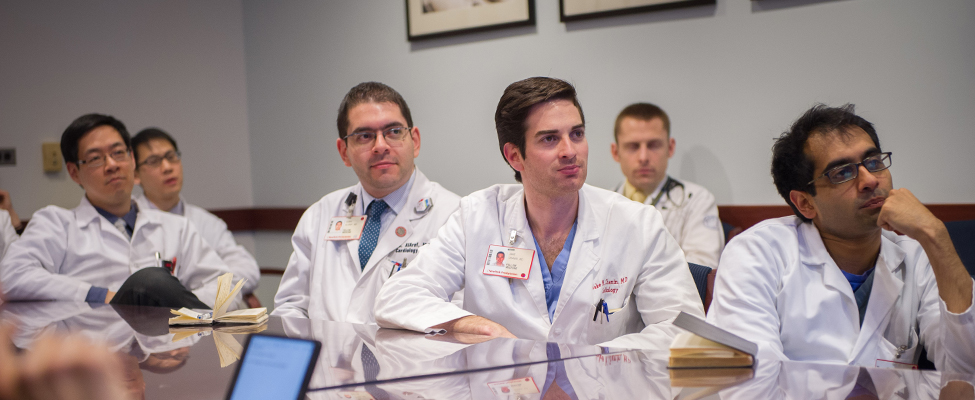Over the past several years, there have been unprecedented advances in the diagnostic and therapeutic options available for patients with cardiac arrhythmias, including new ablation techniques and implantable devices with sophisticated capabilities.
At Weill Cornell Medical College, we offer an advanced training fellowship in Clinical Cardiac Electrophysiology (CCEP), accredited by Accreditation Council for Graduate Medical Education (ACGME).
The Clinical Cardiac Electrophysiology Service of Weill Cornell Medical College/NewYork-Presbyterian Hospital has a high clinical volume related to all aspects of arrhythmia evaluation and treatment. The service is made up of 7 attending electrophysiologists, assisted by nurse practitioners in the device clinic, nurse practitioners on the inpatient service, and research support staff.
The Weill Cornell CCEP Training Program is distinguished by its rigorous clinical experience with an emphasis on the pathophysiologic understanding of the mechanisms of arrhythmias coupled with strong hands-on skills.
Prospective fellows should understand that a successful career in clinical electrophysiology requires a blend of analytical skills, clinical judgment, and procedural expertise. Many procedures are complex and lengthy, and favorable outcomes depend on persistence as well as skill. Those considering a career in this field should be acquainted with the variety of interventions as well as the range of disease processes treated by electrophysiologists.
Those best suited for a CCEP fellowship enjoy the deductive reasoning of electrogram analysis and the challenges of invasive procedures. It is strongly recommended that CCEP fellowship candidates spend time in the invasive laboratory and take part in procedures to gain a sense of the daily demands required of the arrhythmia specialist.
Prior research experience in cardiac arrhythmia management and general cardiology are also considered in our application review process.
Clinical Experience
The Clinical Cardiac Electrophysiology Fellowship consists of two years of intensive clinical training. Fellows undergo extensive training in mapping and ablation of complex arrhythmias, such as atrial fibrillation, atrial tachycardia, and ventricular tachycardia including epicardial ablation. Fellows obtain expertise in device and lead implantation and management of implantable defibrillators (transvenous, subcutaneous and extravascular), cardiac resynchronization therapy devices, conduction system pacing, and leadless pacing. Fellows will also gain expertise in left atrial appendage occlusion. Through Weill Cornell’s participation in IDE trials, fellows will have exposure to novel ablation and device therapies.
Specific rotations within the fellowship are:
- Invasive electrophysiology laboratory, in which fellows perform electrophysiology studies, catheter ablation, cardiac implantable electronic device and left atrial appendage occlusion procedures. (This forms the core of the fellowship.)
- Outpatient consultation and device clinic.
Research
The Electrophysiology laboratory has multiple research programs, and fellows are expected to take part in projects with the goal of presenting at national meetings and publishing in peer-reviewed journals.
Current research projects include the investigation of the following:
- Outcomes after atrial fibrillation ablation including pulsed field ablation
- Genetic basis for cardiac arrhythmias
- Outcomes after conduction system pacing and leadless pacing
- Novel predictors of atrial fibrillation based on population-level analysis
- Barriers to evidence-based management of device associated infections
Education
Weekly EP conference consisting of intracardiac electrogram review, journal club, and research meetings are conducted. A Core Curriculum in electrophysiology is also taught throughout the year by the full-time faculty every week in a small group format.Sessions on intracardiac electrogram review, journal club, and research are also conducted weekly.
Additional conferences include:
- Cardiovascular Grand Rounds (CME)
- Cardiology Clinical Conference (CME)
- Cardiac Catheterization Conference
- Clinical Cardiac Electrophysiology Fellows Journal Club
- Cardiology Fellows Journal Club
- Electrophysiology Core Course
- Fellows’ Clinical Roundtable
- Friday Noon Conference
- Research Meetings
Instructions to Applicants
Fellows must be enrolled in or have completed a fellowship in cardiovascular disease. Fellows are accepted into the program after completing cardiology training.
Applications for July 2026 Weill Cornell Clinical Cardiac Electrophysiology Fellowship will begin being accepted after July 2nd, 2025, with a deadline of September 1st, 2025.
Our program is part of the Medical Specialties Matching Program at the National Resident Matching Program (NRMP), which means that on August 27th, 2025, registration begins with NRMP at www.nrmp.org. Click on specialty match (Cardiovascular Diseases) or call (202) 400-2233 or (866) 653-NRMP (6767) for more information.
Application Schedule
- Notifications are sent out in September 2025 to schedule virtual interviews via Zoom.
- October 1st, 2025, is the earliest date to file a rank order list on the NRMP website.
- November 19th, 2025, is the deadline to file rank order list on the NRMP website by 9PM EST
- December 3rd, 2025, the match results are announced at 12PM EST
Use the Electronic Residency Application Service (ERAS) through your Dean's Office and join the National Resident Matching Program (NRMP).
ERAS Program Code: 1413521202
NRMP Program Code: 1492141F0
Please comply with the following guidelines when completing your application. Only applications with all requested materials will be reviewed.
- Completed ERAS Application
- Letters of Recommendation
- These should be from 2-3 faculty members who have personal knowledge of your professional and personal qualifications. One of these letters should come from your program director or from the service chief under whom you have last served. It is ok to submit more than three letters is ok.) We do not require a Dean's letter.
- Providing USMLE scores is voluntary.
International Applicants
Applicants should have research experience, letters of recommendation from their clinical, and/or research supervisors in the United States and valid ECFMG certification. Though there is no specific board score requirement, a higher score holds greater weight. NewYork-Presbyterian Hospital sponsors J-1 visas only. H1-B visas are not eligible. You will be responsible for retaining an immigration lawyer and for all associated administrative costs. Use the Electronic Residency Application Service (ERAS) through the Educational Commission for Foreign Medical Graduates (ECFMG); and join the National Resident Matching Program (NRMP) for a subspecialty in Cardiovascular Disease. Applicants will be considered for an interview based on their overall record.


